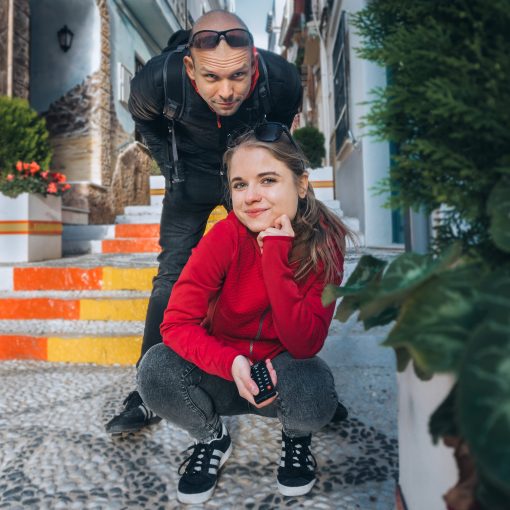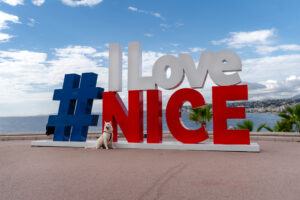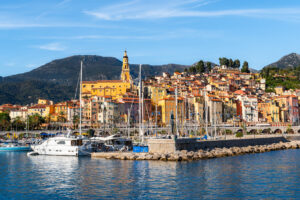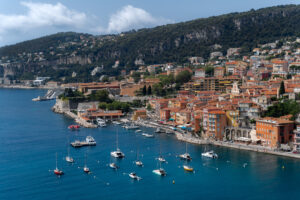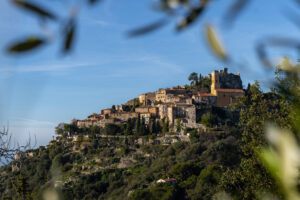Bonjour! Welcome to Frejus, a town with a rich past going back more than two thousand years! There you’ll find three main areas of interest – the inland historic center, the coastal area with port and magnificent beaches, and the Massif de l’Esterel mountain range. All are nicely intertwined, creating an impressive image. In Frejus’ old town, you’ll step back in time and discover traces of the Roman Empire’s power. On the coast, you’ll enjoy the sun, sea, and sand. In the mountains, you’ll get active while admiring breathtaking views from above. Keep reading and discover things to do in Frejus, France.
Travel tip: you can easily visit Frejus and nearby Saint-Raphael during the same-day trip.
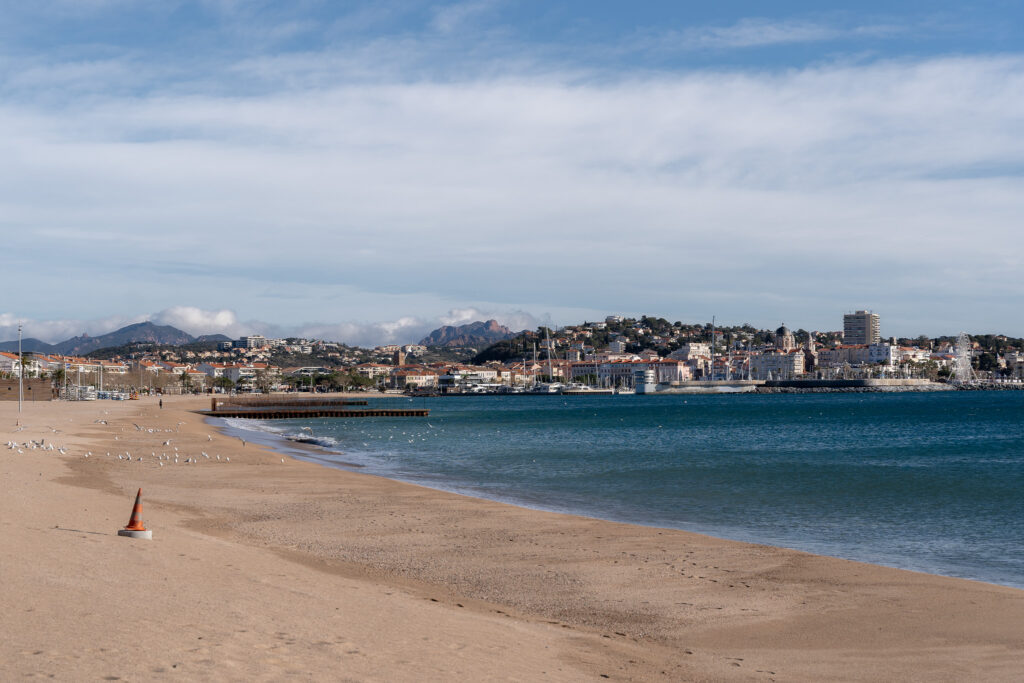
This website uses affiliate links thanks to which we may earn a commission for purchases you made at no additional cost to you. If you like the content, consider using those links to support us. Thank you!
Frejus, France FAQ
Frejus is located in the Provence-Alpes-Cote d’Azur region in the Var department in Southeastern France, on the western side of the Massif de l’Esterel. It neighbors Saint-Raphael town and sits right in the middle between Cannes and Saint-Tropez.
Whether you are a holidaymaker, history geek, or nature lover – there’s something for you in Frejus that makes it worth visiting. From spending relaxing time on sandy beaches and hiking in the mountains to strolling among old town streets and discovering the town’s rich history.
Frejus is best known for being one of the most popular holiday destinations on the French Riviera, featuring many beautiful beaches with spectacular views of the red-hued Massif de l’Esterel. The town is also home to many Roman monuments and one of the oldest Christian buildings in France, all reminding of the two thousand years of rich history.
It’s pronounced [fʁeʒys]. Still don’t know how to read it? Here’s a YouTube video where you can listen to correct pronunciation.


Frejus short history
Frejus can boast a long history dating back to Roman times, more than two thousand years back. The town was founded by Julius Caesar as Forum Julii in the strategic location at the crossroads of two ancient important roads – Via Domitia and Via Julia Augusta. The exact founding date is unknown, but for sure it was before 43 BC. Under Augustus’ rule, Forum Julii became the capital of the province and a major port town in the Mediterranean.
Later, during Tiberius times, many monuments were constructed (like amphitheater, aqueduct, baths, or theater). The town also became an important marketplace for craft and agricultural production. In year 69, the Battle of Forum Julii took place, between Otho and Vitellius emperors. Otho won, and Vitellius retreated. Following this episode, Forum Julii fails to be mentioned again in the historical records. Nowadays, there are still many remnants from the Roman past in Frejus.
In the 4th century the second-largest diocese, after Lyon, was created in Frejus. Church was built in 374 and the bishop was elected. Between the 7th and 9th centuries, Muslims and pirates raided the city which left the monuments in ruin. By the 10th century, there was very little left of the colony. In 1799 Napoleon landed at Frejus while returning from Egypt.


Things to do in Frejus, France
Frejus beaches
Not without a reason Frejus became one of the most popular holiday destinations on Cote d’Azur. There you can find many magnificent beaches perfect for spending time in picturesque surroundings. Frejus beaches can be long and wide, small and secluded, sandy or pebble, lively or peaceful. Everyone will find a perfect one for sure!
The most popular Frejus beaches:
- Plage de Frejus – a sandy beach located close to the Frejus Port, stretching for nearly 1 kilometer. It features nice views over Saint-Raphael and the mountains. There you’ll also find many amenities like on-site parking, toilets, or restaurants along the lovely palm-lined promenade behind the beach.
- Plage de Saint-Aygulf – one of the largest Frejus beaches, located about 4km west of the port. Its exposure to the wind makes it a popular windsurfing and kitesurfing spot. Many amenities are available – like parking, showers, toilets, a beach bar, and lifeguard.
- Plage des Esclamandes – beautiful sandy beach with a nudist section located close to Saint-Aygulf beach. Loved by kitesurfers.
- Plage de la Base Nature – a sandy beach located right next to Frejus Port. Thanks to shallow waters it’s considered perfect for families with kids.
Other nice beaches in Frejus: Plage de la Galiote, Plage du Pébrier, and Plage du Pacha. In our opinion, there is no better thing to do in Frejus than hit the beach – no matter the time of the year!
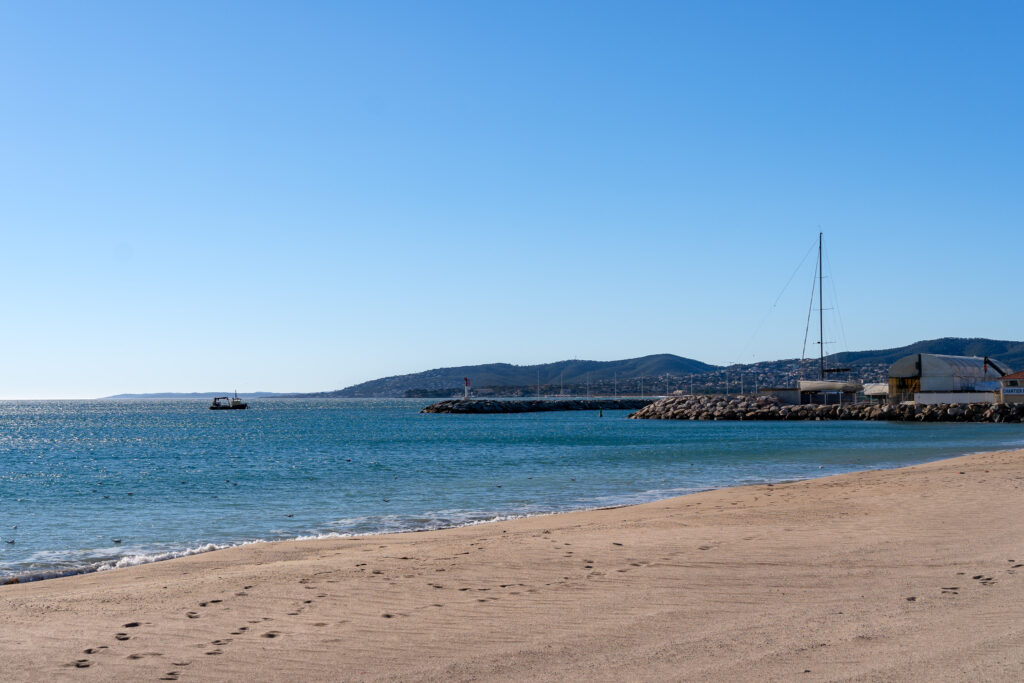
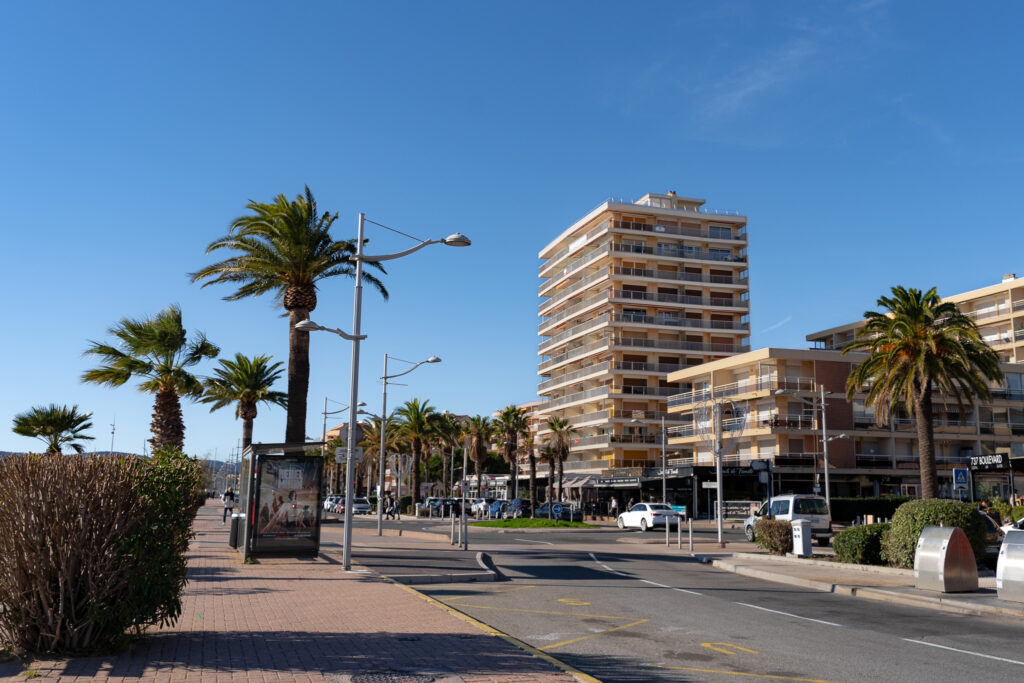
Port Frejus
Port Frejus is located in the modern part of the town, between two popular beaches – Plage de Frejus and Plage de la Base Nature. Just take a pleasant walk among boats of all sizes, residential buildings, and sculptures. When hungry, visit one of many restaurants or bars to try a fresh Mediterranean meal. There you can also rent water sports equipment and book a diving experience or a boat tour. The choice is wide!
![]() Book now: Boat excursion from Fréjus - Calanques Estérel - 3h
Book now: Boat excursion from Fréjus - Calanques Estérel - 3h
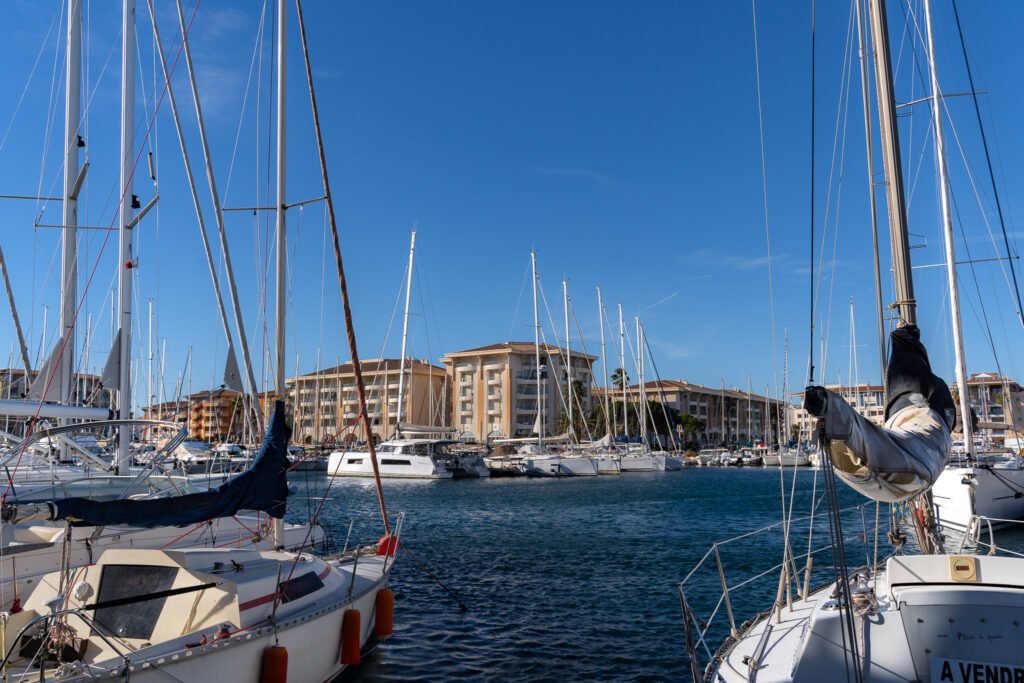

Frejus Old Town
Frejus’ old town is located inland, about 2.5km from the port and beaches. It’s small and there’s no better way of getting to know it than just getting lost among its charming streets and squares full of pastel-painted houses. It’s also fairly peaceful as it looks like not that many travelers arrive there.
Among Frejus’ old town streets, you’ll find points of interest like Place Camille Formigé square with Cathedral and Town Hall, and Archaeological Museum. There are also many restaurants and cafes as well as small craft shops and workshops.
Frejus Tourist Office is located on Rue Jean Jaurès just a few steps from the Cathedral.
![]() Discover: Accommodation options in Frejus
Discover: Accommodation options in Frejus






Frejus Cathedral
Cathedral in Frejus (fr. Cathédrale Notre-Dame et Saint-Léonce de Fréjus) is located on Place Camille Formigé, the town’s main square. Its history dates back to the 4th century when Frejus became one of the first centers of Christianity in France, and the cathedral became the seat of the bishop. Nowadays it’s an impressive building that dominates the town’s skyline and hides many fascinating secrets ready to be discovered. The Cathedral was declared a Historical Monument in 1862.
The cathedral is part of an Episcopal group, a complex of Frejus medieval religious buildings dating from the 5th to the 13th century. Other monuments in the group include the baptistery, cloister, and former Episcopal Palace (now the Town Hall). The baptistery and cloister are part of the Cathedral, while the Episcopal Palace is located on the other side of the square.

Baptistery
Baptistery was built in the 5th century and is considered the oldest Christian structure in Provence and one of the oldest in France. It features a unique octagonal baptismal basin built into the floor – it’s a reminder that in the beginning baptism ritual required full water immersion and was reserved only for adults. Frejus baptistery was only rediscovered in the 1920s and now is one of the finest examples of early Christian architecture.
Cloister
Cloister dates back to the 13th century and features a unique painted wooden ceiling decorated with real and imaginary characters and animals. The cloister is surrounded by a small garden.
Entrance to Frejus Cathedral costs €7 for a normal ticket, and €5.5 for a reduced one (March 2024). For current prices and opening hours visit a cloitre-frejus.fr website. There you can also buy an online ticket in advance.


Archaeological Museum
Right behind the cathedral, you’ll find a small Frejus Archaeological Museum (fr. Musée Archéologique). Inside you’ll find many pieces discovered during archaeological excavations which have been taking place since the 19th century. Findings reveal interesting insights about the Roman town of Forum Julli and the customs of its people. Inside you’ll also find Hermes’ bust, which nowadays is a symbol of Frejus.
Entrance to the Archaeological Museum costs €3 (March 2024). For current prices and opening hours visit ville-frejus.fr website.
Roman ruins in Frejus
Some remnants from the Roman past still stand in Frejus, all of them are located a bit outside the old town. The most popular ruins include:
- Roman Amphitheatre – built in the 2st century, now the only Roman amphitheater in the Var department. In its heyday, it could fit 12k people who came for some entertainment like gladiator or animal fights. Nowadays it’s used for summer events and can fit around 5k people. To learn more about ticket prices and opening hours visit ville-frejus.fr website.
- Roman Aqueduct – Built in the 1st century, it stayed operational for over 400 years. It was an exceptional 42km long structure with 36 arches, which now is a testimony to the technical skills of the Romans. Nowadays, there are few places where you can admire the remains and one of the best is Parc Aurélien.
- Roman Theatre – built in the 1st century, probably as the first performance building in Forum Julii. It hosted various shows, plays, and festivals. To learn more about ticket prices and opening hours visit ville-frejus.fr website.
Exploring the Roman past in Frejus for sure will be a perfect activity for history lovers.


Frejus Market
Looks like almost every day is a market day in Frejus! So if you like strolling among stalls, hunting for some unique souvenir or just watching locals going on with their lives, you’ll be in heaven. Let’s take a closer look at what the city has to offer.
Sunday market takes place every Sunday morning on the promenade behind Plage de Frejus (Place de la République, Boulevard d’Alger, and Boulevard de la Libération). What will you find there? Wide selection of fruits, vegetables, fish, cheese, cold meats, clothing, utensils, toys, furniture, accessories, as well as flowers and plants.
Provencal market takes place twice a week, on Wednesdays & Saturdays, in Frejus old town. Local producers and craftsmen sell seasonal fruits, vegetables, herbs, olives, oils, regional wines, and local crafts.
Night markets take place every day during the summer months in Frejus Port and along Plage de Frejus. Artists and craftsmen offer art pieces, jewelry, toys, accessories, and local specialties.
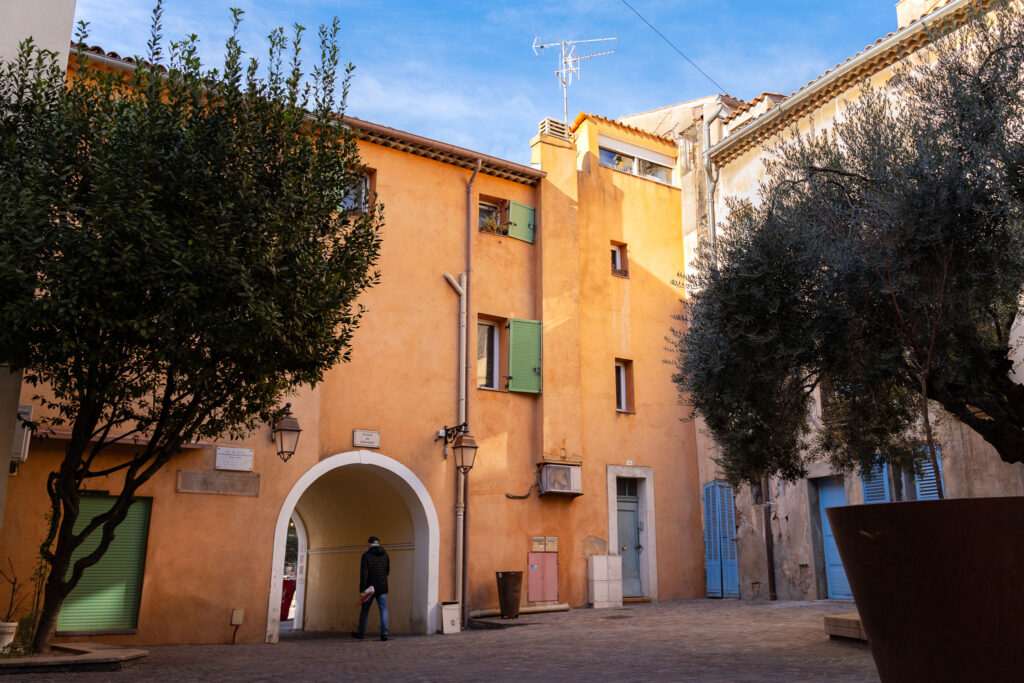

Massif d’Esterel
For nature lovers and active travelers, there is something in Frejus too. Massif d’Esterel is a volcanic mountain range offering trails for hikers and mountain cyclists, all with striking sea and coast views. The highest peak is Mont Vinaigre, which rises to an altitude of 614m a.s.l. For information about all available trails visit circuits.esterel-cotedazur.com website.

How to get to Frejus, France?
Frejus is located about 40km from Cannes or St-Tropez, 50km from Antibes, 65km from Nice, and 90km from Monaco. The most convenient way to get to the town is by car, or bus.
Where to park in Frejus?
In Frejus old town you can leave your car in Parking Paul Vernet, located just a few steps from the cathedral. It’s free in low season, and paid in high – but it’s fairly cheap. Not far from the center you can leave your car for free in Parking Relais Sainte-Croix.
Near Frejus Port and beaches you can choose for example Parking de la Capitainerie or spots along Boulevard d’Alger. Your other option is to leave a car in Saint-Raphaël and walk all the way along the promenade.
![]() For great car rental deals visit: Rentalcars
For great car rental deals visit: Rentalcars
To Frejus by bus
You can also quite easily reach Frejus by bus. For example, a trip from Cannes will take about 45min (€2-5), 35min from Antibes (€2-5) and 1h from Saint-Tropez (€3). To learn more about bus connections that might interest you visit rome2rio.com website.
To Frejus by train
Frejus train station is located in the old town. You can get there from many places on the coast like Nice, Cannes, Menton, or Villefranche-sur-Mer. You can also choose to travel to Saint Raphael and start exploring the area from this town. To learn more about train connections that interest you visit sncf.com or rome2rio.com website. Please note that rome2rio doesn’t show TER connections, so for all results it’s safer to look at the official website.
![]() For great train ticket deals visit: Trainline
For great train ticket deals visit: Trainline
Camping Frejus
If you’re traveling by camper, places like Camping St. Aygulf Beach, Esterel Caravaning Camping or Royal Camping might interest you. They are located in close proximity to Frejus.
To Frejus with an organized tour
If you don’t want to put too much effort into planning, you can always take advantage of the guided tours and let someone else take care of all the details. For a wide selection and well-reviewed tour options be sure to visit GetYourGuide or Viator.
![]() Book now: Calanques and red rocks - Discover the Esterel massif by boat
Book now: Calanques and red rocks - Discover the Esterel massif by boat


Things to do in Frejus, France – Summing up
Rich history, many historical monuments, charming old town, magnificent beaches, stunning views, natural beauty… There’s something for everyone in Frejus and we’re sure that every traveler will find a perfect activity for himself. This town is a great place to slow down for a bit and enjoy the charm of the South of France. We wish you a great time in Frejus!
Our video from Frejus
Our opinion about Frejus
For us, a visit to Frejus was a day trip, combined with a visit to Saint-Raphael, from nearby Cannes where we lived for a few weeks. We visited it in December and during that time both the port/beach area and the old town were fairly quiet, even with the Christmas Market going on. Saint-Raphael was much busier with a higher number of tourists.
For around 5 hours we explored Frejus’ old town, wandered in port, and spent a lovely time on the beach during dinner time. What we liked most was the beach area – it had such a nice and tranquil vibe. And the views from it, in the direction of Saint-Raphael and Massif d’Esterel, were very calming.
As for the old town – we didn’t particularly enjoy it. It was ok but just didn’t make a huge impression on us. We were also surprised by the number of homeless/drunk people as it’s not a very common sight in the South of France. Overall, Frejus might not be the most exciting place on Cote d’Azur but we think it’s an especially amazing spot for holidays. We’d want to spend that time on those amazing beaches!
![]() Book now: The creeks of Estérel - Departure Saint-Raphael
Book now: The creeks of Estérel - Departure Saint-Raphael

Restaurants, accommodations, and map
Check out various recommended places below.
Where to eat in Frejus?
Here are your best, high-rated options in Frejus:
Where to sleep in Frejus?

Les Palmiers
Located in the coastal town of Fréjus, Les Palmiers offers charming and comfortable accommodation for visitors exploring the French Riviera. The property boasts well-equipped rooms and apartments, some with balconies or terraces overlooking the Mediterranean Sea, providing guests with a peaceful retreat. With its proximity to sandy beaches, historic sites, and vibrant cafes, Les Palmiers is an ideal choice for travelers seeking a relaxing seaside getaway.

APPART JL Port Fréjus
Located in Port Fréjus, APPART JL offers modern and spacious accommodation just steps away from the marina and sandy beaches. Guests can enjoy well-appointed apartment featuring amenities such as fully equipped kitchen, private balcony, and air conditioning. With its convenient location and contemporary amenities, APPART JL is an excellent choice for exploring the beautiful coastline and vibrant atmosphere of Frejus.

Villa Romana Fréjus
Nestled in the heart of Frejus, Villa Romana offers charming accommodations with a Mediterranean ambiance. Guests can unwind in spacious rooms adorned with elegant decor, and some units feature private balconies overlooking the picturesque surroundings. With its tranquil atmosphere and proximity to local attractions such as the historic Roman ruins and sandy beaches, Villa Romana provides an idyllic retreat.

